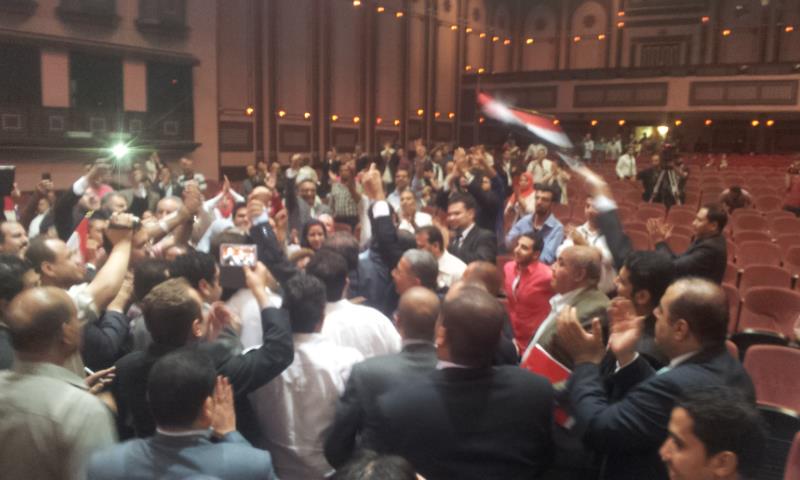When I arrived five minutes late to the Young Poet’s Assembly currently taking place at the Rawabet Theater in downtown Cairo, I found out that I was actually half an hour early – the Ramadan schedule is in full swing.
We – the 15 or so people scattered in the audience – had come after sating our bellies, to indulge our ears and minds with original works read by young poets Mostafa Aly, Mahmoud Ezzat and Gamal Fathy.
The organizer of the assembly Mohamed Abdel-Fattah explained that his primary goal for the multi-genre, 12-poet, four-day event was “for the poets to meet, more importantly than their audiences, each other. But that was not to be today; Fathy never came, and Ezzat barely made it.
While we waited for him to arrive, Mostafa Aly and Ayman Massoud (who seemed to have been recruited from the audience) treated the audience to a reading of selected pieces by late Palestinian poet Mahmoud Darwish.
Darwish’s poetry is always a pleasure to hear, and the delivery was well-turned if uninspiring. Perhaps it was the rush of blood to the digesting stomach, or the hypnotic whir of the fans that are Rawabet’s cooling system, but at times, the setting did feel indeed like a “State of Siege. At times the spell was broken by the children running between the seats, the mobiles going off, or the poets falling momentarily into the drone of rote-reading.
It was when he began reading his own poetry that Aly really started to shine. In a simple yet evocative classical Arabic, and reading with intimacy, he sketched out impressionistic images of night-time one-way streets, schooldays and Alexandria, with memory as one of the themes tying these sensory landscapes together.
Aly’s all-attended rhymes and vast landscapes are somehow reminiscent of T.S. Eliot in atmosphere and choice of detail. It might have been the opening lines of Aly’s first poem, in which a pavement that is “a distance with no shadow makes its last will and testament to the road, or his last piece that paints an almost dreamy portrait of Alexandria’s shop displays and sandpaper wind, but I was captivated.
The same can’t be said about Ezzat’s reading, although his poetry was honest and empathetic. Also drawing on memory as a theme, one poem recreated a school day, using chalk-dust as a sensory hook. But there was something almost too rhythmic and slightly predictable in his use of colloquial Arabic, and the result was somehow less mature. When Ezzat’s reading was ‘on,’ though, his imagery was powerful and precise, if brief.
All in all, the Young Poets Assembly is a much better evening alternative to sitting in front of the television. The assembly is a good initiative with great potential, but it could reach greater heights with some work. The setting could have been enhanced, the selections themed, the publicity more effective and the timing a little better, but the poetry was delicious.


